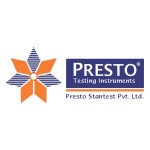Corrosion is a natural enemy of materials, especially metals, which are vulnerable to degradation over time. The salt spray test has become one of the most reliable methods for assessing a material's ability to resist corrosion, particularly in industries where durability is crucial. This blog will cover the essentials of the salt spray chamber, the salt spray test procedure, and factors influencing the salt spray chamber cost.
What is a Salt Spray Chamber?
A salt spray chamber is a specialized testing machine designed to simulate harsh environmental conditions, specifically involving exposure to salt mist or spray. This machine is commonly used for corrosion testing, especially for materials in the automotive, aerospace, marine, and construction industries. The salt spray chamber provides a controlled environment where products and coatings are tested to assess their resistance to corrosion, helping manufacturers ensure product longevity and quality.
The Salt Spray Test Procedure
The salt spray test procedure involves placing test samples inside a chamber where they are exposed to a mist of saltwater solution. The standard solution used is usually 5% sodium chloride, which is atomized into a fine mist and sprayed consistently across the test samples. This exposure continues for a predetermined period, depending on the desired results and industry standards. The test typically ranges from 24 hours to hundreds of hours, based on the product's requirements and the anticipated environmental conditions it will face.
After the test, the samples are examined for signs of corrosion, such as rust, pitting, or surface damage. These results allow engineers and product designers to assess the material's durability and make informed decisions regarding coatings, material selection, or additional corrosion-resistant treatments.
Types of Salt Spray Testers
The salt spray tester can come in various models with different features. Some basic models provide essential salt spray testing, while advanced models include programmable controllers for specific test cycles, automatic refilling systems, and digital display interfaces for easy monitoring.
- Basic Salt Spray Test Machines: These are cost-effective and provide standard testing procedures suitable for smaller labs and specific products.
- Advanced Salt Spray Corrosion Chambers: These chambers come with enhanced features such as humidity control, automatic saline solution refills, and digital interfaces. Advanced chambers are ideal for large-scale production and industries that need precise corrosion testing for diverse materials.
Importance of Salt Spray Testing in Industry
Salt spray testing is critical in industries where products are exposed to harsh environmental conditions, such as saltwater, humidity, and changing temperatures. Corrosion can significantly impact product quality, longevity, and safety. For instance, in the automotive industry, rust on car parts can lead to structural weaknesses, while in the electronics industry, corrosion can lead to short circuits and failure of sensitive components.
With the salt spray test, manufacturers can verify that their products can withstand these challenging environments, providing their customers with reliable, high-quality materials. Furthermore, salt spray testing helps reduce maintenance costs and increases customer satisfaction by ensuring product longevity.
Factors Affecting Salt Spray Chamber Cost
The salt spray chamber cost varies depending on several factors:
- Size and Capacity: Larger chambers capable of accommodating bigger or multiple samples tend to be more expensive.
- Features: Advanced features such as automated saline refills, programmable testing cycles, and digital control panels contribute to a higher cost.
- Brand and Quality: Reputable brands with robust build quality may have a higher upfront cost, but they are often more durable and reliable.
The cost of the salt spray tester should be viewed as an investment in quality control, as a reliable chamber can prevent costly product failures and enhance brand reputation.
Conclusion
A salt spray corrosion chamber is an invaluable tool for testing the corrosion resistance of materials across various industries. With a clear understanding of the salt spray test procedure and the benefits of investing in a high-quality salt spray tester, manufacturers can make informed decisions that enhance product durability and customer trust. While the salt spray chamber cost may vary, its benefits in terms of quality assurance and product longevity make it a worthy investment for any industry focused on delivering corrosion-resistant products.





.jpg)
Comments